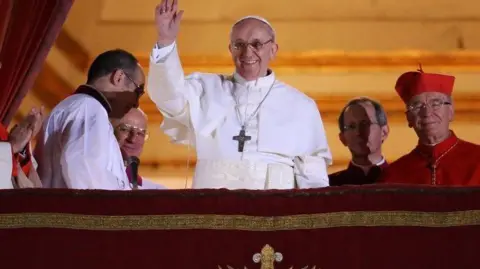From Buenos Aires to the Vatican: Pope Francis
Early Life and Path to Priesthood
The Jesuits, known for their educational, missionary, and charitable work, left a lasting impact on him. Their emphasis on service, social justice, and intellectual pursuit shaped his worldview.
After being ordained a priest in 1969, he went on to hold several leadership roles in the Jesuit community in Argentina. His pastoral work often took him to the slums of Buenos Aires, where he ministered to the poor and vulnerable. This experience became central to his vision of the Church as a place of healing, mercy, and inclusion.
Archbishop and Cardinal
In 1998, Bergoglio was appointed Archbishop of Buenos Aires, and in 2001, he was elevated to cardinal by Pope John Paul II. As archbishop, he lived modestly and was known for his hands-on approach—often riding public transport and cooking his own meals. He continued to champion the causes of the poor, spoke out against government corruption, and pushed the Church in Argentina to be more present in the lives of ordinary people.
Becoming Pope
When Pope Benedict XVI resigned in 2013, the first papal resignation in nearly 600 years, Bergoglio emerged as a surprise choice to succeed him.
Upon his election, he chose the name Francis, after St. Francis of Assisi, a saint known for his love of the poor, humility, and care for nature. The name set the tone for his papacy.
From the very beginning, Pope Francis emphasized simplicity and accessibility. He chose not to live in the papal palace, instead residing in a modest guesthouse. He quickly gained global attention for his warm demeanor, plain language, and a pastoral style that prioritized compassion over doctrine.
Focus on Mercy and Reform
Pope Francis has made mercy a central theme of his papacy. He declared 2015–2016 as the Jubilee Year of Mercy, encouraging Catholics around the world to show forgiveness and kindness. He believes the Church should be a "field hospital"—a place where people find healing and acceptance, not judgment.
One of his key missions has been Vatican reform. Under his leadership, efforts have been made to increase transparency in the Church’s finances, address clerical sexual abuse, and streamline the Church’s complex bureaucracy. Though these efforts have faced resistance and remain ongoing, they reflect his desire to make the Church more accountable and relevant.
Social and Environmental Advocacy
Pope Francis has been an outspoken advocate on global social issues. In 2015, he released the encyclical Laudato si’, which called for urgent action on climate change and criticized environmental exploitation and consumerism. He framed ecological responsibility as a moral duty, especially to protect the poor who suffer most from environmental degradation.
He has also spoken forcefully about the rights of refugees, economic inequality, and the dangers of political extremism. His message is often centered on solidarity, inclusion, and peace.
Challenges and Criticism
Despite his widespread popularity, Pope Francis has faced criticism, particularly from traditionalists within the Church. His openness to divorced Catholics receiving communion, his remarks on LGBTQ+ inclusion, and his less rigid stance on some Church teachings have sparked debate. Some see him as too progressive, while others believe he has not gone far enough in addressing issues like women’s roles in the Church.
Nevertheless, Pope Francis remains one of the most respected moral leaders in the world. He continues to push for a Church that is closer to the people—humble, inclusive, and responsive to the challenges of modern life.
A Lasting Impact
In a rapidly changing world, Pope Francis has redefined what it means to lead the Catholic Church in the 21st century. His emphasis on mercy, care for the poor, interfaith dialogue, and stewardship of the planet has resonated far beyond the Church’s walls. Whether speaking to global leaders or washing the feet of prisoners, he consistently reminds the world of the core Christian values of love, service, and humility.


Comments
Post a Comment